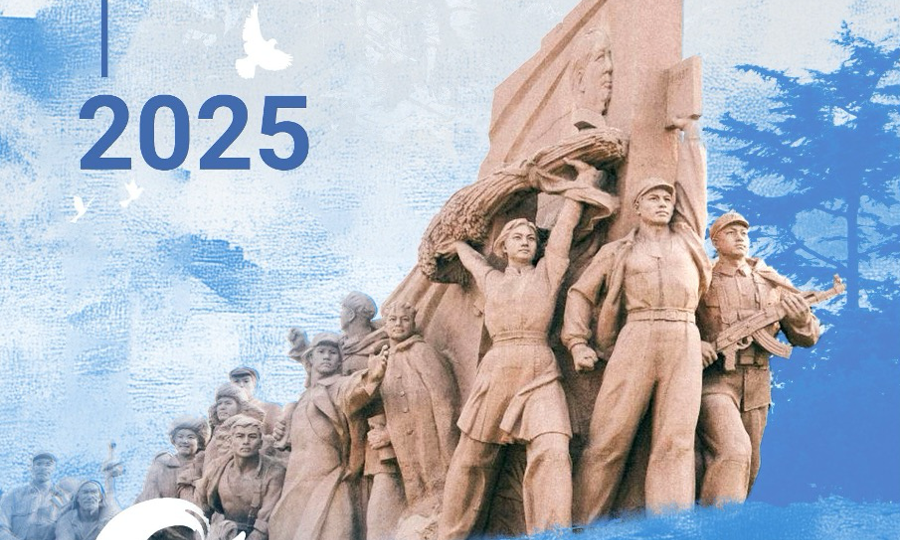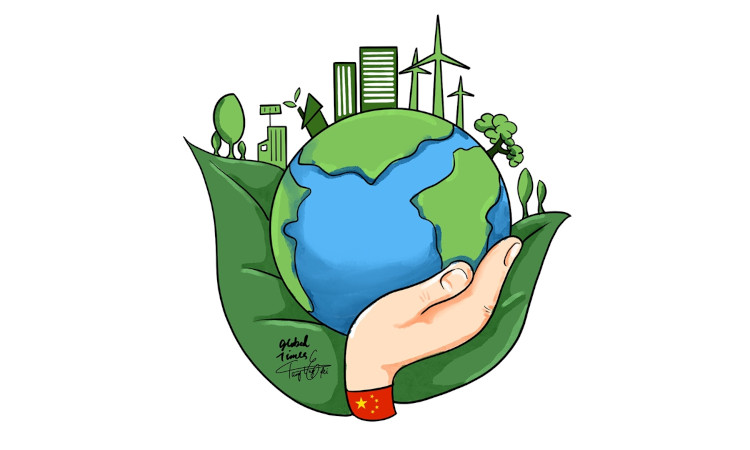Join us in London to celebrate the 70th anniversary of China’s revolution
6.30pm, Saturday 28 September, Bolivar Hall, 54 Grafton Way, W1T 5DL
Tickets are free. Book your place via Eventbrite.
Speakers include George Galloway, Counsellor Zhang Liming of the Chinese embassy and our party’s founding chairman Harpal Brar.
*****
On 1 October 1949, having defeated feudal landlords, comprador capitalists and Japanese occupiers, the People’s Liberation Army rolled triumphantly into Beijing, and the revolution’s leader, Chairman Mao Zedong, announced to the world: “The Chinese people have stood up.”
When the communists came to power, the overwhelmingly peasant country had suffered from a century and a half of colonial plunder. Life for the average Chinese peasant, crushed by greedy landlords and imperial overlords, was brutal, nasty and short. Ruling-class violence, extreme poverty, lack of education, healthcare or sanitation, and frequent outbreaks of disease and famine meant that average life expectancy was a mere 35 years, with infant mortality as high as 500 per thousand births in the poorest provinces.
Despite having had to start from such an incredibly low base, at the time of Mao’s death in 1976, the results of socialist economic planning could clearly be seen. Agricultural cooperatives, rural clinics, vigorous public health and literacy campaigns, mass education and the laying of an industrial base for the country’s further development had combined to produce the most rapid increase in life expectancy and decrease in infant mortality ever recorded. The population had doubled, average life expectancy stood at 65 years of age, literacy had jumped from 20 to 68 percent, and famine had become a thing of the past.
These achievements, which laid the foundation for everything else that China has been able to achieve, were made by the efforts of the Chinese alone. No colonised peoples had their wealth stolen in order that China’s industrial base could be built (as was the case in Britain, for example); no slums were created for the workers to fester in while a few industrialists lived in luxury off the fruits of their labour. Chairman Mao had no personal fortune to bequeath to his heirs when he died.
Having thus offended against all the ‘laws of nature’ (as laid down by the free-market fundamentalists), China has gone on to develop its industrial, agricultural, scientific, technical and military might to unprecedented levels. It has become the world’s largest economic power and is doing everything in its power to catch up in the fields of science and technology. It has already overtaken the USA in telecommunications and is putting huge efforts into other important areas of research and development such as robotics, artificial intelligence and green technology.
Despite the marketisation of much of its economy, China still retains an all-important ability to make long-term plans, and is thus the only country making meaningful advances in addressing climate change.
Meanwhile, China continues to lift its citizens out of poverty at a rapid rate, reversing the trend in the rest of the world, where the poor are becoming daily more numerous, despite the technological advances that should enable everyone on the planet to be fed, housed, clothed, educated and employed in meaningful work. On the basis of the advances made by China during the first three decades after liberation, the country’s subsequent rapid industrialisation has enabled it to transform from a country of poor peasants into a prosperous nation.
In 2015, even the imperialists were forced to admit that only 3.5 percent of China’s people remained in poverty, with 850 million people having been lifted out over the last seven decades (by contrast, ten percent of people in Britain today are ‘food insecure’). The Chinese government is confident that by 2020 absolute poverty in the country will have been completely eradicated, and it will be able to move on to targeting and abolishing relative poverty.
Literacy in the country has reached over 96 percent, while among school-age children, it is over 99 percent. Average life expectancy is now 76 years, comparable with the richest nations on earth.
These are earth-shattering achievements and, as far as the rulers of the capitalist world are concerned, they set an extremely dangerous example as to what can be done when their rule is dispensed with.
But even without having committed the cardinal sin of having made a socialist revolution, China would still be targeted, merely for the crime of independence.
With the extension of market mechanisms into so much of China’s economy in recent decades, there is much debate about whether it can still be described as socialist or not. But, important as that is for the Chinese, for our purposes it makes no difference at all.
China is a target of the imperialists because she is home to a massive labour force, huge natural resources and a mass of technical know-how. These, at present, are not open to the lords of finance capital in the way they would like. It is true that capitalists can invest in China, making profits out of the work of Chinese labourers, but the extent of their profiteering is to some extent limited and they are by no means free to loot China’s vast natural resources in the way they have come to expect as their (God-given) right.
Moreover, China has used her growing financial strength to offer terms of trade and development to other poor and developing countries on a ‘win-win’ basis of friendship and respect, paying decent prices for raw materials, delivering promised technology and infrastructure, and offering loans at preferential rates that are not aimed at beggaring the country concerned or destroying its independence. Moreover, China has a strict policy of non-intervention in the internal affairs of the countries with which it deals.
Although China strives to maintain peaceful and friendly relations with all, her ‘fair trade’ policy cannot help cutting the ground out from under the imperialists’ feet, who have always used their monopoly on advanced goods and technologies to force the most heinous conditions onto countries whose raw materials they ‘acquire’ (loot) at rock-bottom prices and whose governments they control by means of threats and bribes.
China’s policy of independence has also made her a thorn in the side of the imperialists internationally. Since Libya taught the world a painful and bloody lesson in what happens when the US and friends are allowed to do ‘peace-keeping’ unhindered, China, like Russia, has refused to allow the United Nations security council to rubber stamp imperialist war plans, thus rudely ripping the ‘democratic’ fig leaf from their naked aggression.
To those who expect the world to be run along lines of simple human logic, it seems strange that countries should not be able simply to live and let live, or that businesses should be incapable of settling for a more modest rate of profit. But capitalism runs by its own logic, which has nothing to do with human logic, and its primary driver is the need to maximise profits at all costs, forcing businesses into constant expansion, and the more capitalistically advanced countries to seek total domination – of the world’s markets, of its workers, of its investment opportunities and of its raw materials.
At a time of deep economic crisis in the world capitalist system, it is simply impermissible to the imperialists that China’s markets, workers and raw materials should have any level of protection from their unfettered plunder. Desperate to save themselves and ride out the crisis, there is no crime they are not prepared to commit in the hope of bringing the whole world under their control.
We have seen this in recent times with the war against Syria, as we saw it with Yugoslavia, Afghanistan, Iraq and Libya before that. We can see it in the economic and media wars waged against Iran, Venezuela, Cuba and north Korea, and in the drive to war with Russia and China. All these countries, in some way or other, held fast to their independence in the face of demands that they should submit to imperialist diktat and control.
The ongoing protests in Hong Kong can only be understood in this context. The corporate media narrative about a popular ‘movement for democracy’ against the ‘dictatorial’ and even ‘foreign’ Chinese would be laughable if it were not so serious.
There was no democracy in Hong Kong before the Chinese took back control of the territory from Britain in 1997. It was a colony, stolen at the point of a gunboat by the East India Company as a punishment for China’s losing the opium wars, and it was dictated over by a British governor with British armed forces at his back. Poor Chinese under British rule in Hong Kong lived in far worse conditions than most animals and had absolutely no say in the running of the province.
Despite everything the British (and now also the Americans) have done to try to instil the more privileged residents of Hong Kong with a superiority complex and a sense of a separate ‘identity’, the people of Hong Kong are Chinese. The sight of hyped-up student mobs setting on ‘mainland Chinese’ and beating them while they hurl racist anti-Chinese taunts reveals not only their depravity but also the fundamental confusion that this superiority mindset has engendered.
The attempts of these ‘NGO’-sponsored hooligans to provoke the police into a repressive response are straight out of the US’s ‘colour revolution’ playbook. These are the same tactics that forced independent-minded or Russia-friendly governments out of office in eastern Europe over the last two decades. It is the same strategy that kicked off the war in Syria in 2011, and which has recently been used to try to provoke ‘civil war’ in Venezuela and Nicaragua.
And, as ever, such attempts are accompanied by a massive propaganda blitz by British and US media against the government they are seeking to topple, accusing it of every crime under the sun except the real one, which is simply ‘getting in the way of our profit-taking’.
It doesn’t matter if China is socialist or not.
It doesn’t matter whether you believe in socialism or not.
If you believe that the world should be run according to human logic rather than the logic of imperialist brigandage; if you believe that people should be allowed to choose their social systems and governments for themselves; if you believe that a country’s people should be able to benefit from the wealth of their own resources, you should support China against all imperialist-backed attempts at regime change.
The government of China is a matter for the Chinese people alone.
The achievements of China’s revolution, on the other hand, are a cause for celebration by all humanity. They offer vital proof of the truth that while the capitalists can never do without workers, the workers can do just fine without the capitalists.














